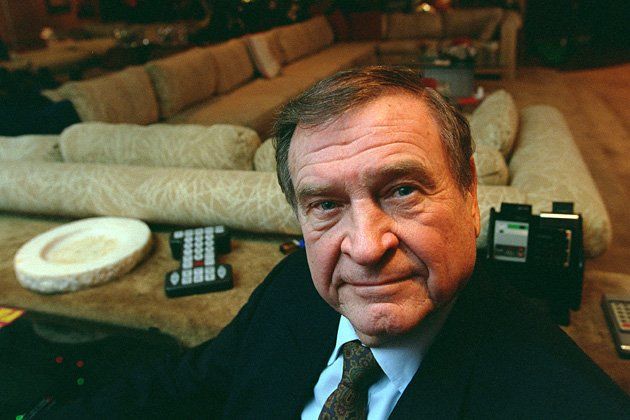
As a kid who grew up in a working-class neighborhood in Chicago, the son of an alderman, and a Democratic committeeman, Rep. Daniel Rostenkowski, who died Wednesday at age 82, had a heightened appreciation for the symbols of power and wealth. One of his most prized possessions was a Camp David jacket presented to him by President George H.W. Bush. "Rosty" was a frequent guest at the presidential retreat, and the two men were golfing buddies.
Though he was a Democrat through and through, nobody worked and played better with Republicans than Rosty. He was first elected to Congress in 1958, and by the time Ronald Reagan was elected president in 1980, had risen to become chairman of the House Ways and Means Committee, the tax-writing powerhouse that would first smooth the way for Reagan's tax cuts and then, in 1986, in Reagan's second term, enact major tax reform.
Rosty's support was critical, giving Reagan's program momentum in the Democratic-controlled House and assuring voters that this wasn't a giveaway to the rich and that middle America would benefit, too. He supported Reagan's reduced tax rates on individuals and corporations, and in his televised Democratic response to the president's call for reform, told voters to write him in Washington to show their support. "Just address it to R-O-S-T-Y," he said, and the tens of thousands of letters that flowed to his office made him a hero and Reagan's tax reform a reality.
As chairman of Ways and Means, Rosty accumulated an impressive list of legislative credits. He helped save Social Security from insolvency and quietly worked with Reagan lieutenants, and then George H.W. Bush, to plug some of the fiscal holes that Reagan's tax policies had created. He was at the peak of his power when he ushered through the Medicare Catastrophic Coverage Act of 1988, which offered an array of new and expanded benefits to senior citizens, including federal funding for prescription drugs.
He thought seniors would be grateful for greater health security in exchange for a relatively modest surcharge on their Medicare bill. Instead they were incensed at the notion of paying more money to the government, and at a town-hall meeting in 1989 in his Illinois district, Rosty's constituents rebelled, waving protest signs at him, calling for his impeachment, and finally chasing him out of the room and down the street until he was able to take refuge in his car. Then they pounded on his car, some using their crutches, a scene so graphic and memorable that three months later, Congress repealed the program.
The experience no doubt made Rostenkowski wary of his next brush with health-care reform, which was with the Clintons. He was notably unhelpful to the first lady in her efforts to craft legislation, and complained that her health adviser, Ira Magaziner, a Yale Law School classmate of the Clintons, was out of touch with working-class American and that there was no one in the White House "who had dirt under their fingernails."
Rosty was the epitome of what people think of when they imagine a Chicago pol. He was gruff and profane and didn't think much of what he called "women's lib." There weren't that many women in top positions during Rosty's heyday. "Who invited Pocahontas?" he famously asked when a long-haired woman he didn't know but who was a senior congressional staffer left the room after attending a meeting. At least he didn't say it in front of her.
Rosty's identification with working-class aspirations remained strong even as he gravitated to the attributes of power. He liked to hold forth at Morton's steakhouse in Georgetown, where he would down scotches in "Rosty's Rotunda," a booth that was set aside for him and his lobbyist buddies, along with some journalists.
In 1994, Rosty's grand lifestyle came to a crashing end when he was indicted for his role in what was known as the House post-office scandal. He was charged with putting people on his congressional payroll that did little or no work, and routinely using his congressional funds to pay for family cars and gifts for friends. It was all amazingly petty, and the charge that got the most media attention was that he traded in stamps issued to him as a member of Congress for cash at the post office. That charge was eventually dismissed, but Rostenkowski did plead guilty to mail fraud and spent 15 months in federal prison in Wisconsin and another two in a halfway house in Chicago.
He emerged from confinement looking buff and without expressing remorse over what he had done. Rather, he saw himself as a victim of changing rules and his crimes as nickel-and-dime offenses that overzealous federal prosecutors used to advance their own careers at his expense. In December 2000, shortly before leaving office, President Clinton pardoned Rostenkowski, saying he "had done a lot for his country and had more than paid for his mistakes." As those who knew and worked with him mourn his passing, it is his legislative leadership that is so sorely missed today on Capitol Hill, while the offenses he was guilty of are as rampant as ever.
Uncommon Knowledge
Newsweek is committed to challenging conventional wisdom and finding connections in the search for common ground.
Newsweek is committed to challenging conventional wisdom and finding connections in the search for common ground.





